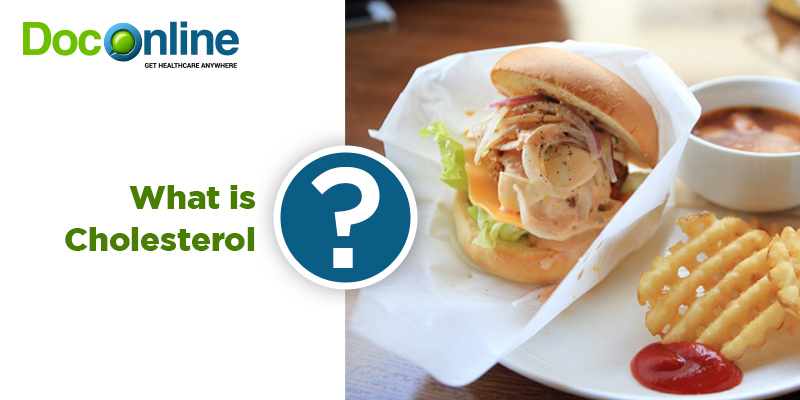What is Cholesterol?
Cholesterol is a naturally occurring product found in the body, which is produced by the liver. It is vital to the normal cell functioning and is the parent molecule for major hormones such as oestrogen, progesterone and testosterone. It is critical to the functioning of the immune system and the brain. Cholesterol metabolizes all the fat-soluble vitamins like vitamin A, D, E and K among other things.
Your body produces its own cholesterol and also has the ability to down-regulate the production if it senses there is too much cholesterol in the blood. When you take drugs to reduce cholesterol, your body up-regulates or steps up its production. Your body tries to compensate for what is missing. Dietary cholesterol (cholesterol from food) can only be obtained from animal products. Hence, cholesterol is a very important component in human body.
What is Good Cholesterol and Bad Cholesterol?
Low Density Lipoprotein (LDL) is known as bad cholesterol. In the first place, it is not even cholesterol. It is lipoprotein, which serves as the carrier molecules for cholesterol. It picks up the cholesterol from the liver and delivers it to the cells.
High Density Lipoprotein (HDL) is known as good cholesterol. It is the carrier molecule that removes excess cholesterol from blood, taking it to the liver.
What are the Causes of High Cholesterol?
Genetic : Ancestral hypercholesterolemia is seen in 1 out of every 500 individuals.
Poor diet : Eating saturated fat found in animal products, and trans fats will also increase your total cholesterol.
Large waist circumference :Your risk increases if you are a man with a waist circumference of at least 40 inches (102 centimetres) or a woman with a waist circumference of at least 35 inches (89 centimetres).
Lack of exercise : Exercise helps boost your body's HDL or "good" cholesterol while increasing the size of the particles that make up your LDL or "bad" cholesterol, thus making it less harmful.
Smoking : Smoking damages the walls of your blood vessels, making them likely to accumulate fatty deposits. Smoking may also lower your level of HDL, the good cholesterol.
Diabetes : High blood sugar contributes to higher LDL cholesterol and lower HDL cholesterol.
Does High Cholesterol Cause Heart Disease?
That there is a direct correlation between cholesterol and heart disease has not been found as yet. Heart disease is more likely to be a result of stress and the consumption of processed foods, especially refined sugar. When you have stress in the body, it causes a spike in cortisol. This breaks down the vitamin C. When you have a long-term subtle deficiency of vitamin C, it causes weakening of the arterial walls. Subsequently, it causes the readily available cholesterol in the bloodstream to patch up the weakening arterial walls.
This is the body trying to protect itself from arterial wall damage. We call this healing process atherosclerotic plaques or heart disease. Hence, it is now proven that it is not cholesterol that causes heart disease, instead its inflammation, which results in plaque formation and atherosclerosis.
One needs to keep a watch on the so called bad cholesterol (LDL). Eating saturated fats—which are the main diet-linked cause of high cholesterol—tends to raise one’s HDL and also increases the LDL. These fats are mostly found in animal foods such as beef, lamb, poultry, pork, butter, cream, and milk, palm and palm kernel oil, and cocoa butter.
Besides, the difference between saturated fat and cholesterol needs to be highlighted. Raw fats from a healthy natural diet are good. The body needs these in order to thrive. They even help to reduce heart disease. Great sources of healthy fats include nuts, wild fish, wild and grass-fed meats, seeds (such as chia and flaxseeds), avocados, eggs, olive oil and coconut oil.
In contrast, artificial and chemical fats from processed food need to be avoided at all times.
How to take care of your heart?
Here are 5 ways to improve cardiac health irrespective of cholesterol levels:
- Exercise: Three weeks of high-intensity interval training significantly boosts women’s HDL levels by 21% and lowers triglycerides by 18% percent. Men who jog and then run at a high intensity for equal periods show significant improvement in their HDL levels over eight weeks.
- Eat a low-salt diet, one that includes many fruits, vegetables and whole grains.
- Limit the amount of animal fats and use good fats in moderation.
- Shed the extra pounds and maintain healthy weight.
- Quit smoking.
- If you consume alcohol, do so in moderation.
So, adopt a healthy lifestyle to ensure a healthy heart
Looking for Doctor's Advice?













